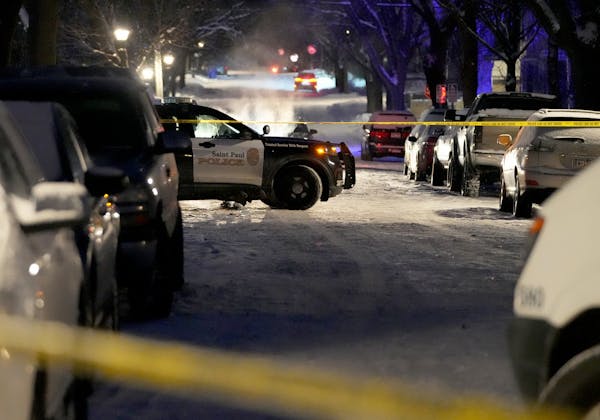More than 100 people attended a virtual town hall Monday to raise safety concerns after a double homicide last week at a downtown St. Paul light-rail station.
The meeting focused on the building where two men were shot, which includes a stairwell and elevator connecting the skyway bridge crossing Cedar Street to the Green Line. Residents said they're scared to go outside in parts of downtown because of gun violence and fear increased drug activity has been taking place around the light-rail station.
"It almost feels like an abandonment zone has been set up in downtown St. Paul," attendee Milly McLean said. "I'm sitting here as a resident saying, 'OK, is it time to go before I actually get shot by somebody?'"
Police responded the night of Dec. 12 to the double homicide in the station stairwell, and found 18-year-old David Burton Johnson and 21-year-old Ellijah Marquise Payne with gunshot wounds. The St. Paul natives were brought to Regions Hospital, where they were pronounced dead.
Police have yet to make arrests but are following up on leads, interim Metro Transit Police Chief Rick Grates said at the meeting.
Representatives from Metro Transit, the St. Paul police department and the city's Office of Neighborhood Safety laid out safety plans at the meeting including contracting with a private security company and installing shaded windows to prevent people from looking out from the station tower.
Metro Transit is also aiming to close the tower for safety improvements by Friday — while also keeping in mind the needs of people with disabilities who rely on the elevator, General Manager Wes Kooistra said.
A city-organized workgroup focused on downtown safety has been meeting monthly since August, said Brooke Blakey, Office of Neighborhood Safety director. Part of the group's plan will be to work with the city and Metro Transit police to boost enforcement, she said.
Meeting attendees said they also want the city to increase services for people struggling with mental health and drug abuse in order to improve downtown safety long-term.
"Just as we are struggling to find police officers, we're struggling to find beds for individuals that need that substance use and mental health help," Blakey said. "We know that we can't arrest ourselves out of these problems."

Charges: Minneapolis man, out-of-state cohort filed more than 100 false tax claims totaling $3M

Walz weighs in on canceled Minnesota cannabis license lottery: Litigation 'happens in every state'

Gov. Tim Walz calls for tougher Medicaid fraud penalties as FBI investigates autism centers

Minnesota abandons early cannabis lottery, retail pot sales likely to start later than expected

